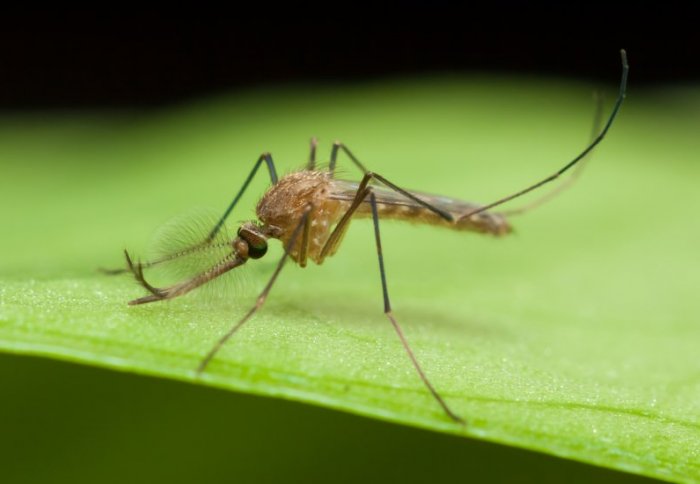Antibiotics could be affecting mosquitoes' ability to transmit malaria

Mosquitoes' ability to transmit malaria could be being affected by antibiotics in the blood of those they bite, according to new research.
Ultimately, we hope that understanding any hidden effects of different antibiotics would mean we can combat the spread of malaria more effectively.
– George Christophides
Professor of Infectious Diseases & Immunity
Malaria is a parasitic disease that infects hundreds of millions of people and kills over 600,000 every year. The disease is transmitted by mosquitoes that become infected with the malaria parasite when they bite an infected person and ingest their blood. Within a couple of weeks they start to pass on the disease when they bite another person.
When mosquitoes become infected with malaria parasites, many of the parasites are killed off through competition with bacteria in the mosquitoes’ guts. As antibiotics target bacteria, the researchers behind the new study wanted to explore whether ingesting the blood of someone who is taking antibiotics might affect the bacteria in the mosquitoes and, through this, affect their susceptibility to the parasite.
The new study, published in Nature Communications and led by Imperial College London, looked at a combination of the antibiotics penicillin and streptomycin. This drug cocktail is not used to combat malaria and it was chosen because it does not directly affect the malaria parasites, enabling the researchers to focus on its effects on bacteria in the mosquitoes’ guts.
After mosquitoes were fed on blood taken from malaria patients who had taken penicillin and streptomycin, bacterial growth inside the mosquitoes’ guts was severely hampered. This made the mosquitoes more prone to infection by malaria parasites, which compete with these bacteria for resources [see sidebar]. It also caused the mosquitoes to live longer, which increased their chances of surviving long enough to pass on the parasite to another person.
Many different antibiotics are in use in countries where malaria is endemic, for a variety of reasons. Some, such as doxycycline, are used to prevent people contracting malaria; others are used to treat tuberculosis or HIV. In addition, antibiotics are used in mass-drug administration programmes to combat neglected tropical diseases such as trachoma, yaws and filariasis. Such programmes have significantly reduced childhood mortality.
Although the new study found that one combination of antibiotics made it easier for mosquitoes to transmit malaria, the researchers stress that they are not suggesting people should avoid using antibiotics. Rather, they believe that more work needs to be carried out, including modelling and epidemiological studies, to explore how different combinations of antibiotics affect mosquitoes’ ability to spread malaria, so that appropriate measures can be taken.
Dr Mathilde Gendrin, the lead author of the study from the Department of Life Sciences at Imperial College London, said: “Antibiotics are a valuable weapon in the fight against malaria and other diseases. Our study suggests that the presence of antibiotics in people’s blood may have hidden effects on the guts of mosquitoes when mosquitoes ingest that blood, and that these effects could alter the mosquitoes’ ability to transmit malaria.
“We only looked at two antibiotics in our study, so this is early stage research and we don’t know what it means for other antibiotics – it’s possible other antibiotics might have no effect, or that they might make it harder for mosquitoes to transmit malaria. We would like to see much more research carried out to further understand our findings and to explore how other antibiotics might affect bacteria in the guts of mosquitoes,” she added.
Professor George Christophides, the director of the research, also from Imperial's Department of Life Sciences, said: “Ultimately, we hope that understanding any hidden effects of different antibiotics would mean we can combat the spread of malaria more effectively. For example, if particular antibiotics make mosquitoes more able to transmit malaria, the use of these could be combined with supply of bed nets in order to reduce mosquito bites.
“Additionally, if a doctor prescribed such antibiotics to a malaria patient, they could combine this with a drug such as atovaquone that can both treat malaria and block its transmission. This might be particularly important for young children, who are both highly vulnerable to malaria infection and very efficient at transmitting the parasite to mosquitoes. We might also be able to identify and prioritise antibiotics that do not promote malaria transmission,” he added.
Reference: "Antibiotics in ingested human blood affect the
mosquito microbiota and capacity to transmit
malaria," Nature Communications, 6 January 2015. Corresponding Author George Christophides, Imperial College London. DOI: 10.1038/ncomms6921
Article supporters
Article text (excluding photos or graphics) © Imperial College London.
Photos and graphics subject to third party copyright used with permission or © Imperial College London.
Reporter
Laura Gallagher
Communications Division